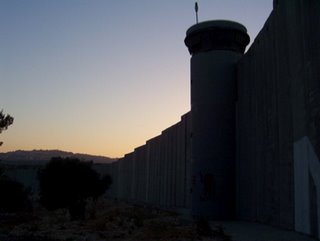Beit Sahour, the town where I live, is famous throughout Palestine for its fierce devotion to independence and amazing use of nonviolence during the first intifada. Beit Sahour launched community wide tax strike in protest of the occupation, for which residents suffered greatly. But more impressively, Beit Sahour managed to boycott every Israeli product on the market. Under the Israeli military occupation, the economy of Palestine has been fiercly subjected and Palestinians, once extremely successful farmers, have become dependent on Israeli goods. But during the first intifada, Palestinians organized victory gardens and were able to feed themselves, even during long months of 24-hour curfew. In Beit Sahour, the boycott was successful. Sahouris met all of their needs without relying on Israeli good. All of their needs, that is, except milk. That's where the cows of Beit Sahour come in. Here's my friend Helen to tell the story.
During the first intifada the people of Beit Sahour wanted to become independent and self-sufficient. They withheld taxes from the Israeli government and wanted to grow their own vegetables, bake their own bread … and milk their own cows. However they wanted to do it in such a way that irritated the Israeli military. They organised courses in horticulture and the wealthier activists bought 18 cows
Imagine, a group of middle class men that have no experience of livestock arriving in a field in the middle of night with a trailer full of cows. They knew nothing about cows, not even how to get them out of the trailer. After asking the cows politely to please come out someone decided to bang on the side. The cows came charging out scattering the men far and wide. After 4 hours of trying to round up the animals, but running the other way as soon as one turned round, the local villagers came to help and the cows were settled into their new home.
Every day the cows were milked and the milk delivered early in the morning to the house round the town by young men covering their heads and faces with kaffiyeh's. It drove the local military commander wild. Eventually the IDF turned up at the field and demanded that the cows were removed. The activists refused and the military went away. A few days later they returned and again demanded that the cows go and went round taking individual photos of the cows.
The villager that was employed to look after the cows was repeatedly intimidated and assaulted by the IDF quit his job so people from Beit Sahour started looking after the cows themselves. After repeated harassment from the IDF the activists decided that the cows needed to be moved to a secret location. Eventually a suitable cave was found, it belonged to a butcher, he used it to keep cows in before he slaughtered them.
The cows were collected in the middle of the night and delivered to the cave, the disappearance drove the military commander crazy. The milk was still being delivered but the cows were nowhere to be seen. Soldiers were sent door to door in Beit Sahour with the mug shots of the cows asking townspeople if they recognised them. Eventually the soldiers came to the butchers house and looked in the cave, initially they didn't spot the cows but a stray moo gave them away. The 18 terrorists had now been found.
The butcher had a cover story and maintained the cows now belonged to him and he was keeping them until they calved and then would kill them. The soldiers arrested him for non-payment of taxes (for which he could be held for 48 hours) when released he was immediately rearrested. The activists decided this was unacceptable so the cows were again collected in the middle of the night and distributed around the local villages.
Two years later one of the original team that bought the cows was arrested and questioned on an unrelated matter. The Beit Sahour military commander found out he was there and said to him "What the hell happened to those cows." When telling us this story the activist said "I now know I caused him sleepless nights thinking about the cows. That alone made it all worthwhile"
So ends the story of the cows of Beit Sahour.





